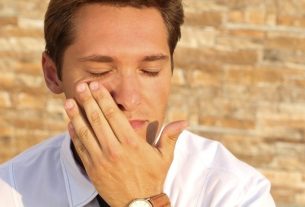Andropause is a situation characterized by a decrease in testosterone production by men, which usually happens around the age of 50. Andropause is popularly known as men’s menopause.
The decrease in testosterone levels causes symptoms similar to those of menopause to appear in women, such as mood changes, decreased libido and excessive tiredness.
Although andropause is a normal stage in men’s aging, it can be controlled through testosterone replacement, especially when andropause symptoms are very intense and cause discomfort, and should be prescribed by an endocrinologist or urologist.

Andropause symptoms
The symptoms of andropause are:
- Excessive tiredness;
- Frequent mood changes and irritability;
- Heat waves;
- Decreased libido;
- Erection difficulty;
- Decrease in the amount of hair on the body;
- Loss of muscle mass and increase in the amount of fat in the body;
- Redistribution of fat, with an increase in fat and breast growth;
- Difficulty concentrating and short-term memory loss;
- Insomnia.
These symptoms can interfere with a man’s daily life, and it is important to consult a doctor sooner so that an evaluation can be carried out and the most appropriate treatment can be indicated.
In some very rare cases, symptoms may be caused by a condition known as hypogonadism, in which the testicles do not produce enough testosterone. Learn more about hypogonadism.
Online symptom test
Select the symptoms you may be experiencing from the test below to find out your risk of having andropause:
How the diagnosis is made
The diagnosis is carried out by a urologist or endocrinologist, who may request some blood tests to assess the man’s health status, such as:
- Total and free testosterone;
- PSA;
- FSH;
- LH.
Prolactin measurement may also be indicated, as changes in this hormone in men may indicate some dysfunction.
How the treatment is carried out
Treatment for andropause must be guided by a urologist and endocrinologist according to the symptoms presented by the man and testosterone levels and aims to alleviate symptoms and prevent the development of complications, such as heart disease, anemia and osteoporosis.
In most cases, it is recommended that men undergo hormone replacement therapy, which can be done with some medications recommended by the urologist, which include:
- Cyproterone acetate, testosterone acetate or testosterone undecanoate tablets;
- Dihydrotestosterone gel;
- Testosterone cypionate, decanoate or enanthate injections, applied once a month;
- Testosterone patches or implants.
Another way to improve the symptoms of andropause is through some lifestyle changes, such as having a healthy and balanced diet, reducing the consumption of salt and foods rich in fats and sugars, practicing physical activity, avoiding smoking and consumption of alcoholic beverages.
Furthermore, the use of nutritional supplements that contain vitamins, minerals and antioxidants can also help control low testosterone levels in the blood. See other ways to increase testosterone.
Possible side effects
Hormone replacement therapy with testosterone should not be used to increase muscle mass and should always be guided by a doctor, as it can have serious health effects, which include:
- Aggravate prostate cancer;
- Increase the risk of cardiovascular diseases;
- Increase liver toxicity;
- New onset or worsening of sleep apnea;
- Acne and increased skin oiliness;
- Allergic skin reactions due to the application of adhesives;
- Abnormal enlargement of the breast or the appearance of breast cancer.
Furthermore, this treatment is contraindicated in men with suspected prostate or breast cancer, or in cases where it has been confirmed, due to side effects related to hormone replacement therapy. Therefore, before starting treatment, the doctor must recommend tests to investigate the presence of cancer, liver disease and cardiovascular problems, thus avoiding this type of complication.

Sign up for our newsletter and stay up to date with exclusive news
that can transform your routine!
Warning: Undefined array key "title" in /home/storelat/public_html/wp-content/plugins/link-whisper-premium/templates/frontend/related-posts.php on line 12
Warning: Undefined array key "title_tag" in /home/storelat/public_html/wp-content/plugins/link-whisper-premium/templates/frontend/related-posts.php on line 13



